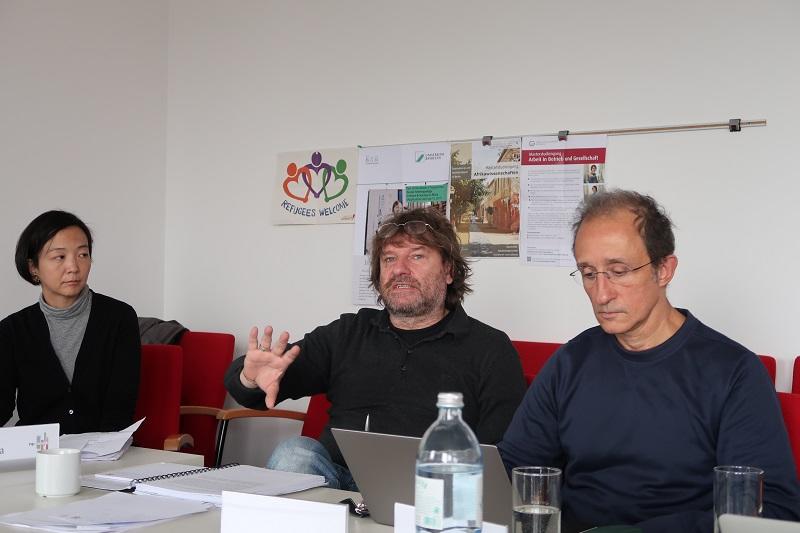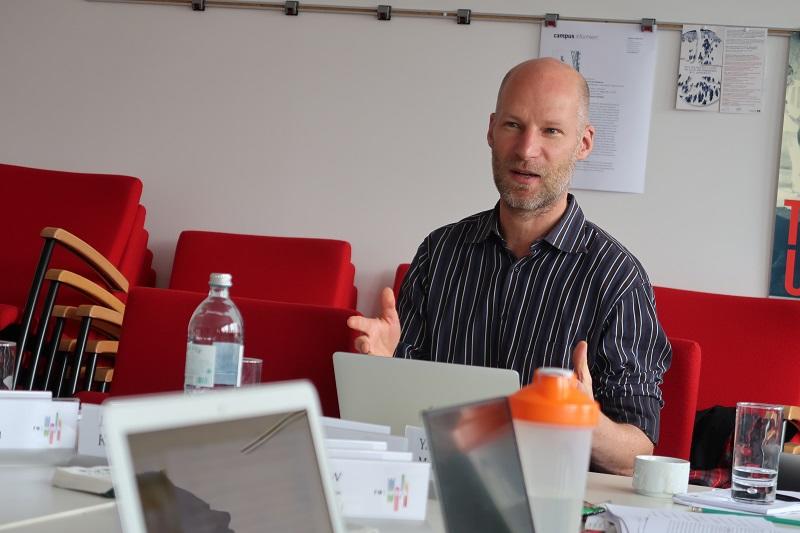2017.10.20
第3回サマースクール報告(5日目) GHC Summer School 2017 Report (Day 5)
最終日となる9月8日の午前中には、Yaruipam Muivah氏(EHESS)とFabian Steininger氏(ベルリン自由大学)が発表した。Muivah氏は論文”Servitude and Abolition in Colonial North-East India, 1881-1930”において、インド北東部における奴隷制度とその廃止について分析した。ディスカッサントのChristoph Plath氏はこの事例が世界史においてどのような位置づけなのか等の疑問を投げかけた。フロアを交え、アフリカの奴隷制度との関係や自由や資本主義という概念との関連性、そして数ある先行研究を踏まえた上でインド北東部の事例を取り上げる意義が議論された。
続いてSteininger氏はオスマン朝における倫理について扱った博士論文の一部である”Mass Violence against Istanbul Armenians in August 1896”と題した章について論じた。Steininger氏は、集団的「怒り」という感情に着目し、1896年イスタンブールで起こったアルメニア人に対する暴力を読み解いた。ディスカッサントの寺田悠紀は、revolt、massacre、genocide、という語がトルコではどう使われているのか、集団の感情や行動と個人の関係性についてコメントした。フロアからは論文や記事の書き方についても具体的な質問や指摘が挙がった。
午後は、シニアメンバーを中心に、National Narratives of Global Integrationと題したラウンドテーブル形式のディスカッションが行われた。最初に、Matthew Karp助教授は南北戦争と主に北米における歴史を紹介した。民主主義、資本主義、自由や平等という概念についても言及した。続いて羽田正教授は日本における歴史認識と叙述の変遷を説明し、「東洋史」という分野が生まれた背景、戦前と戦後日本の歴史観の違いなどを紹介した。次に、Alessandro Stanziani教授はソ連の歴史、そしてNatasha Wheatley助教授はオーストリア=ハンガリー帝国の歴史を事例として、それぞれの特色を論じた。これらの発表を受けてSebastian Conrad教授は、国家史には特殊性と世界全体に共通する普遍性が両方備わっていると主張した。また、統合(integration)について考える上で考慮すべき要素として、外部との関わりの中で国家史が描かれる際に生まれる劣等感を挙げた。最後にフロアを交え、国家史を踏まえた、もしくは超えた文脈で世界史を叙述する方法、そして今後研究成果をどのような形で発表することが相応しいのか議論された。
プログラムの終了後、参加者にはベルリンの主催者からサマースクール修了証が授与され、5日間に及ぶ発表と討論が幕を閉じた。GHCサマースクールは今年で3回目の開催となる。毎年参加しているシニアメンバーや今回2回目となる参加者も数名いたため、それぞれの経験を活かしサマースクールのプログラムを円滑に進行することが出来たと感じる。ジュニアメンバーも今後オンラインベースで議論を続け、交流を続けていく予定である。 (文責:寺田 悠紀)
During the morning of September 8, the final day of the 2017 GHC Summer School, Yaruipam Muivah (EHESS) and Fabian Steininger (Free University of Berlin) presented reports. Muivah’s paper, “Servitude and Abolition in Colonial North-East India, 1881-1930,” analyzed the slave system in Northeast India and its abolition. Discussant Christoph Plath questioned how this case should be placed in global history. Muivah exchanged views with participants on the floor about the slave system’s relationship with the African slave system and its association with the concepts of freedom and capitalism. Participants also discussed the significance of conducting case studies on Northeast India based on numerous past research.
Next, Steininger presented “Mass Violence against Istanbul Armenians in August 1896,” a chapter from his doctoral thesis, which deals with morals in the Ottoman Empire. Steininger focused on the emotion of collective “anger” and interpreted the violence against Armenians that occurred in Istanbul in 1896. Discussant Yuki Terada commented on the relationship between mass emotions and actions and individuals, asking how the words “revolt,” “massacre,” and “genocide” are used in Turkey. Participants on the floor asked specific questions and commented on how to develop the way of writing his thesis and article.
In the afternoon, a roundtable-style discussion on the topic of “National Narratives of Global Integration” was held, with senior members as the main panelists. First, Assistant Professor Matthew Karp introduced the history of the American Civil War in the context of the history of the North America. He also discussed the concepts of democracy, capitalism, freedom and equality. Next, Professor Masashi Haneda explained changes in the understanding and writing of history in Japan, introducing the background leading to the birth of the field called “Oriental history” and differences in Japan’s view of history before and after the Second World War. Next, using examples Professor Alessandro Stanziani discussed the distinctiveness of Soviet history. Assistant Natasha Wheatley did the same with the Austro-Hungarian Empire. Based on these presentations, Professor Sebastian Conrad asserted that they had both distinctiveness in their national histories and global universality. He also brought up the sense of inferiority that arises when writing national history amid interactions with the outside world and commented that it is an element that should be taken into account when thinking about global integration. Finally, the panelists exchanged views with participants on the floor about methods of writing global history based on national histories or transcending individual national history, and how research results can be appropriately presented going forward.
After the end of the program, 2017 GHC Summer School participants were given a certificate of completion from their Berlin host, bringing five days of presentations and discussions to a close. The GHC Summer School was held for the third time this year. Because there are a number of senior members who have participated every year and graduate students who have participated two times now, their experience allowed the summer school programs to be smoothly carried out. There is a plan for junior members to continue their discussions online and sustain their exchanges. (Yuki Terada)






















